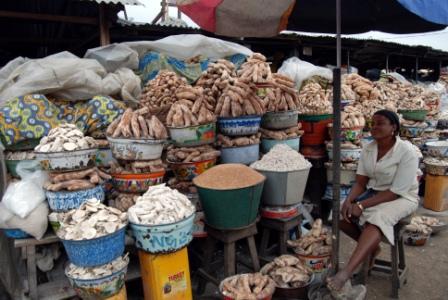Breaking News
Nigeria Inflation Rises To Highest Rate In Over Six Years

Nigerian inflation accelerated in May to the highest rate since February 2010 as food, electricity and other energy costs drove up prices in Africa’s largest economy, Bloomberg reports.
The inflation rate rose to 15.6 percent from 13.7 percent the month before, the Abuja-based National Bureau of Statistics said in an e-mailed statement on Tuesday. The median of 19 economist estimates compiled by Bloomberg was 14.7 percent. Prices rose 2.8 percent in the month as a result of “an overall increase in general price level across the economy,” the statistics office said.
Electricity and fuel prices were “key drivers” of inflation, which was also pushed by higher food costs, the statistics agency said.
Food inflation accelerated to 14.9% from 13.2% in April. The average price for a liter (0.26 gallon) of gasoline was 150.28 naira ($0.76) in May, compared with 162.82 the previous month, according to a separate report from the statistics bureau.
The May number “goes to show the high inflationary path that the Nigerian economy is taking,” Pabina Yinkere, head of research at Lagos-based Vetiva Capital Management Ltd. said by phone. “This is a fallout of low oil prices, currency weaknesses and energy shortages.”
Nigeria imports at least 70 percent of its refined fuel, despite pumping 1.4 million barrels of crude a day, and faces fuel shortages as retailers struggle to get foreign currency to buy product. The government increased the cap on the gasoline price by 67 percent to 145 naira per liter last month, saying it could help ease the shortfall across the country.
While the Central Bank of Nigeria may introduce a dual exchange-rate system and weaken the currency when it unveils a new policy, the naira peg at 197-199 per dollar since March last year and restrictions in trading foreign currencies have made imports more costly for a nation that’s a net importer of food and refined fuel. Governor Godwin Emefiele left the benchmark rate unchanged at 12 percent last month after the economy contracted in the three months through March for the first time since 2004.
“The challenge for the authorities is how to go about normalizing the foreign-exchange regime,” Razia Khan, head of Africa macro research at Standard Chartered in London, said in an e-mailed note to clients. “Any moves towards meaningful foreign-exchange flexibility will need to be supported by tightening, in order to restore some degree of credibility to policy.”






